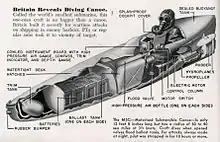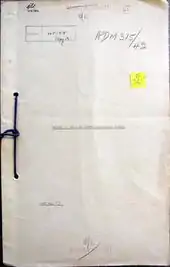Motorised Submersible Canoe
The Motorised Submersible Canoe (MSC), nicknamed Sleeping Beauty, was built by British Special Operations Executive (SOE) during World War II as an underwater vehicle for a single frogman to perform clandestine reconnaissance or attacks against enemy vessels.
 | |
| Class overview | |
|---|---|
| Name: | Motorised Submersible Canoe |
| Operators: |
|
| Succeeded by: | Swimmer Delivery Vehicle |
| General characteristics | |
| Type: | Wet sub |
| Displacement: | 600 pounds (270 kg) |
| Length: | 12 ft 8 in (3.86 m) |
| Beam: | 2 ft 3 in (0.69 m) |
| Propulsion: | One 24v electric motor (0.5 hp), powered by four 6v batteries |
| Speed: | 4.4 knots (8.1 km/h) maximum, 3.5 knots (6.5 km/h) cruise |
| Range: | 40 nautical miles (74 km) |
| Test depth: | 50 ft (15 m) |
| Crew: | 1 |
| Armament: | Nine limpet mines, 3.5 pounds (1.6 kg) of explosives |
Design
The MSC was designed by Major Hugh Quentin Alleyne Reeves, R.E., who was also given the task of designing an 'unspecified device' for an underwater approach.[1] based on an idea from Lt Col"Blondie" Hasler DSO OBE RM[2] which he called the 'underwater glider' and developed at Aston House to Hasler's specifications.[3] The craft got its nickname "Sleeping Beauty" when Reeves was found sleeping in it by a passing officer. Seemingly for no apparent reason, a good deal of rubbish has been written about the ‘Sleeping Beauty’, including that the craft was built by the Gosport shipbuilding business, Camper and Nicholson. Source: 'Blondie', Ewen Southerby Tailylor Further research shows [4] that it was Station IX, The 'Frythe', where the MSC was developed NOT ASTON House. Also the Reeves was 'entirely responsible for the initial conception and design'. However it was Hasler, who 'suggested to the designer Major Reeves that if he altered the shape of the SB to more of the shape of a canoe it would become a much better sea boat'.[5] It is likely that the UWG aka MSC had its origins from a unsimilar idea, apart from its underwater nature, originally from Hasler.[6]

Constructed of mild steel, the canoe is 12 feet 8 inches (3.86 m) long with a beam of 27 inches (0.69 m), used a 5 hp electric motor powered by four 6-volt batteries, had a top speed of 4.4 knots (8.1 km/h; 5.1 mph), and could travel 30 to 40 nautical miles (56 to 74 km) at a cruising speed of 3.1 knots (5.7 km/h). Its maximum operating depth was 50 feet (15 m). All the correct details concerning the MSC is available within the 'Cockleshell Canoes' publication.
The Sleeping Beauty was designed to carry up to 3.5 pounds (1.6 kg) of explosives as well as being able to be dropped near its target by a heavy bomber. Fore and central trimming tanks within the hull can be flooded to sink the craft underwater or have compressed air blown in them to surface the craft. The pilot controlled the craft by a joystick that is connected to the rudder and diving planes, breathed through a Siebe Gorman Salvus MkII Amphibian rebreather or Dunlop Underwater Swimming Breathing Apparatus (UWSBA), and would have to come close to the surface to establish his whereabouts. The canoe can also be paddled or moved by raising the mast and setting a sail. Although the Sleeping Beauty was designed to accommodate only one pilot,a later model did attempt to produce a two-man version post war.[7] Different configurations were tried on the MSC such as the positioning of the hydroplanes; these were positioned aft, but sometimes moved forward during experimental work. The High Pressure air tanks (H.P.) could afford four blows to the surface from 40 ft and up to 20 blows to the surface from 15 ft.[8]
During the end of 1943 the MSC was referred to the "Assault Warfare Sub Committee" (AWSC) and had trials conducted at Queen Mary Reservoir. There the MSC was compared with the Chariot and Welman. The MSC was found to be small (up to 15 canoes could be carried in a larger submarine's torpedo storage compartment), light, easier to navigate, simple to operate, and quick to build. However, the craft was very difficult to control.
Operation
The MSC's usual method of operations was "porpoising" in quick rises to the surface to check bearings, then shallow diving. This manoeuvre required the pilot to put the bow of the Sleeping Beauty to the water's surface and watch the reflection of it underneath the surface, and just when the bow was about to meet with its reflected image the Sleeping Beauty would be put into a dive so that the pilot's head would come out of the water and he was able to see his direction.
The pilot could leave the Sleeping Beauty to swim and plant limpet mines on enemy ships, rather than piloting the MSC to the target directly.
Operational service
SBs were also used for Operation Rimau, a raid on Japanese shipping in Singapore in September 1944 by commandos from the joint Australian, British and New Zealand Z Special Unit, sometimes known as "Z Force". After being found by a patrol boat, the Sleeping Beauties had to be scuttled along with the junk in which they were carried. Ten of the attacking force were taken prisoner by the Japanese and subsequently beheaded.
A pair of Sleeping Beauties are believed to have been captured by German forces after an unsuccessful attack on enemy shipping in Måløy by members of the Norwegian Independent Company 1. The divers were landed with their SBs on the nearby island of Gangsøy. However, a local shepherd girl saw them and, thinking that they were thieving Germans, she reported them to the authorities. The divers were then chased across Norway by the Germans until they were picked up safely and taken back to their base in the Shetland Islands.
In the summer of 1944, "Sleeping Beauty Number 72" was delivered to the United States Office of Strategic Services (OSS), the forerunner of the CIA, and became the early prototype for today's Swimmer Delivery Vehicle. It was used from December 1944 to August 1945 to evaluate United States harbour defences, stage mock attacks on capital ships and develop underwater communications equipment.
UCWE Trials Report on Sleeping Beauty

In November 1954, the Clearance Diving Trials Team attached to the Admiralty's Underwater Countermeasures and Weapons Establishment (UCWE) at Leigh Park House near Havant in Hampshire issued a report on the Sleeping Beauty, signed off by the Officer-in-Charge of the team, Lt Cdr Gordon Gutteridge RN:
Gallery
References
Citations
- Rees, Cockleshell Canoes
- Blondie, Ewen Southby Tailyour, Leo Cooper, 1998, p74
- Blondie, Ewen Southby Tailyour, Leo Cooper, 1998, p126
- Rees, Cockleshell Canoes
- Quentin Rees research 2018:IWM voice recording No.8388 J D. Stewart and Public Records Office:ADM1/21986
- Further research,yet unpublished, from noted reliable historian Quentin Rees
- Rees, Cockleshell Canoes
- Rees, Cockleshell Canoes
Bibliography
- Anderson, Ross. (2010) Report on background and maritime archaeological survey for a Motorised Submersible Canoe (MSC) or ‘Sleeping Beauty’ lost 1945, HMAS Stirling, Careening Bay, Cockburn Sound. Western Australian Museum
- Popular Science Magazine, March 1947. ISSN 0161-7370
- Rees, Quentin. (2008) Series: Most Secret. Cockleshell Canoes: British Military Canoes of World War Two. Amberley Publishing ISBN 978-1-84868-065-4.
External links
- http://museum.wa.gov.au/maritime-archaeology-db/maritime-reports/report-background-and-maritime-archaeological-survey-motorised-submersible-canoe-ms
- http://www.mcdoa.org.uk/News_Archive_25.htm
- http://www.underwatertrust.org.uk/chariots/sleeping-beauty
- http://www.bbc.co.uk/history/worldwars/wwtwo/soe_gallery_11.shtml

